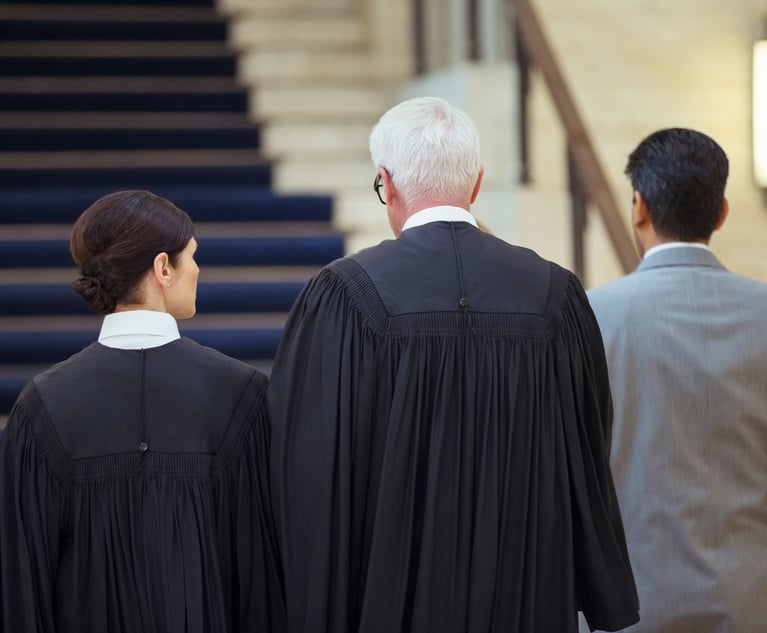Judicial Ethics Opinion 19-136
A full-time judge may serve on the board of a not-for profit performing arts center, even if a government official appoints him/her.
July 13, 2020 at 09:58 AM
4 minute read
The Advisory Committee on Judicial Ethics responds to written inquiries from New York state's approximately 3,600 judges and justices, as well as hundreds of judicial hearing officers, support magistrates, court attorney-referees, and judicial candidates (both judges and non-judges seeking election to judicial office). The committee interprets the Rules Governing Judicial Conduct (22 NYCRR Part 100) and, to the extent applicable, the Code of Judicial Conduct. The committee consists of 27 current and retired judges, and is co-chaired by former associate justice George D. Marlow of the Appellate Division and the Honorable Margaret Walsh, a justice of the Supreme Court.
Digest: A full-time judge may serve on the board of a not-for profit performing arts center, even if a government official appoints him/her.
Rules: 22 NYCRR 100.2; 100.2(A); 100.4(A)(1); 100.4(C)(2)(a); 100.4(C)(3); 100.4(C)(3)(a)(i)-(ii); 100.4(C)(3)(b)(i), (iv); Opinions 12-108; 01-04; 98-35; 97-10.
Opinion: A full-time judge asks if he/she may serve on the board of a not-for-profit performing arts center, where the appointment or designation would be made by the same elected non-judicial official who appointed the judge to judicial office. If permitted to accept the appointment, we understand the judge would not represent the appointing official on the board but would instead exercise his/her own independent judgment as a director.
A judge must always avoid even the appearance of impropriety (see 22 NYCRR 100.2) and must always act in a manner that promotes public confidence in the judiciary's integrity and impartiality (see 22 NYCRR 100.2[A]). Thus, a judge's extra-judicial activities must not "cast reasonable doubt on the judge's capacity to act impartially as a judge" (22 NYCRR 100.4[A][1]). A full-time judge may serve as an officer or director of a not-for-profit cultural organization (see 22 NYCRR 100.4[C][3]), assuming it is unlikely to be "engaged in proceedings that ordinarily would come before the judge" (22 NYCRR 100.4[C][3][a][i]) or "engaged regularly in adversary proceedings in any court" (22 NYCRR 100.4[C][3][a][ii]). However, a judge must not "personally participate in the solicitation of funds or other fund-raising activities" (22 NYCRR100.4[C][3][b][i]) nor permit the use of judicial prestige for fund-raising or membership solicitation (see 22 NYCRR 100.4[C][3][b][iv]).
Judges may serve on boards of a wide variety of not-for-profit arts-related organizations, including a charitable foundation that determines applications to fund projects in the arts (see Opinion 12-108), a county-wide arts council (see Opinion 98-35), and a regional performing arts theater (see Opinion 97-10).
The novel question here is whether appointment to this position by an elected non-judicial official creates any appearance of impropriety. We believe a 501(c)(3) not-for-profit performing arts center does not become "a governmental committee or commission or other governmental position" within the meaning of Section 100.4(C)(2)(a) merely because a governmental official is empowered to appoint to the board. [1] Further, in our view, the fact that the judge was appointed to his/her judgeship by this same official is immaterial, as we understand the judge will not act as the official's representative, but will instead exercise his/her own independent judgment as a director (cf. Opinion 01-04 [judicial candidate must not present awards "on behalf of and as the representative of public officials"]).
Thus, this full-time judge may join the board of a not-for profit performing arts center, even if the appointment is by a government official. Thus, in serving on the board, he/she must abide by all relevant limits on judicial speech and conduct, and the restrictions on fund-raising and giving legal advice.
|
[1] A full-time judge must "not accept appointment to a governmental committee or commission or other governmental position that is concerned with issues of fact or policy in matters other than the improvement of the law, the legal system or the administration of justice" (22 NYCRR 100.4[C][2][a]), although he/she may "represent a country, state or locality … in connection with historical, educational or cultural activities" (id.).
This content has been archived. It is available through our partners, LexisNexis® and Bloomberg Law.
To view this content, please continue to their sites.
Not a Lexis Subscriber?
Subscribe Now
Not a Bloomberg Law Subscriber?
Subscribe Now
NOT FOR REPRINT
© 2024 ALM Global, LLC, All Rights Reserved. Request academic re-use from www.copyright.com. All other uses, submit a request to [email protected]. For more information visit Asset & Logo Licensing.
You Might Like
View AllTrending Stories
- 1Call for Nominations: Elite Trial Lawyers 2025
- 2Senate Judiciary Dems Release Report on Supreme Court Ethics
- 3Senate Confirms Last 2 of Biden's California Judicial Nominees
- 4Morrison & Foerster Doles Out Year-End and Special Bonuses, Raises Base Compensation for Associates
- 5Tom Girardi to Surrender to Federal Authorities on Jan. 7
Who Got The Work
Michael G. Bongiorno, Andrew Scott Dulberg and Elizabeth E. Driscoll from Wilmer Cutler Pickering Hale and Dorr have stepped in to represent Symbotic Inc., an A.I.-enabled technology platform that focuses on increasing supply chain efficiency, and other defendants in a pending shareholder derivative lawsuit. The case, filed Oct. 2 in Massachusetts District Court by the Brown Law Firm on behalf of Stephen Austen, accuses certain officers and directors of misleading investors in regard to Symbotic's potential for margin growth by failing to disclose that the company was not equipped to timely deploy its systems or manage expenses through project delays. The case, assigned to U.S. District Judge Nathaniel M. Gorton, is 1:24-cv-12522, Austen v. Cohen et al.
Who Got The Work
Edmund Polubinski and Marie Killmond of Davis Polk & Wardwell have entered appearances for data platform software development company MongoDB and other defendants in a pending shareholder derivative lawsuit. The action, filed Oct. 7 in New York Southern District Court by the Brown Law Firm, accuses the company's directors and/or officers of falsely expressing confidence in the company’s restructuring of its sales incentive plan and downplaying the severity of decreases in its upfront commitments. The case is 1:24-cv-07594, Roy v. Ittycheria et al.
Who Got The Work
Amy O. Bruchs and Kurt F. Ellison of Michael Best & Friedrich have entered appearances for Epic Systems Corp. in a pending employment discrimination lawsuit. The suit was filed Sept. 7 in Wisconsin Western District Court by Levine Eisberner LLC and Siri & Glimstad on behalf of a project manager who claims that he was wrongfully terminated after applying for a religious exemption to the defendant's COVID-19 vaccine mandate. The case, assigned to U.S. Magistrate Judge Anita Marie Boor, is 3:24-cv-00630, Secker, Nathan v. Epic Systems Corporation.
Who Got The Work
David X. Sullivan, Thomas J. Finn and Gregory A. Hall from McCarter & English have entered appearances for Sunrun Installation Services in a pending civil rights lawsuit. The complaint was filed Sept. 4 in Connecticut District Court by attorney Robert M. Berke on behalf of former employee George Edward Steins, who was arrested and charged with employing an unregistered home improvement salesperson. The complaint alleges that had Sunrun informed the Connecticut Department of Consumer Protection that the plaintiff's employment had ended in 2017 and that he no longer held Sunrun's home improvement contractor license, he would not have been hit with charges, which were dismissed in May 2024. The case, assigned to U.S. District Judge Jeffrey A. Meyer, is 3:24-cv-01423, Steins v. Sunrun, Inc. et al.
Who Got The Work
Greenberg Traurig shareholder Joshua L. Raskin has entered an appearance for boohoo.com UK Ltd. in a pending patent infringement lawsuit. The suit, filed Sept. 3 in Texas Eastern District Court by Rozier Hardt McDonough on behalf of Alto Dynamics, asserts five patents related to an online shopping platform. The case, assigned to U.S. District Judge Rodney Gilstrap, is 2:24-cv-00719, Alto Dynamics, LLC v. boohoo.com UK Limited.
Featured Firms
Law Offices of Gary Martin Hays & Associates, P.C.
(470) 294-1674
Law Offices of Mark E. Salomone
(857) 444-6468
Smith & Hassler
(713) 739-1250










